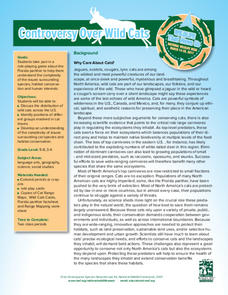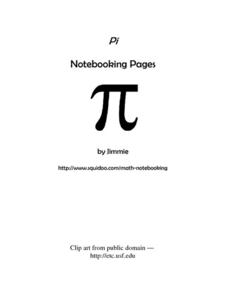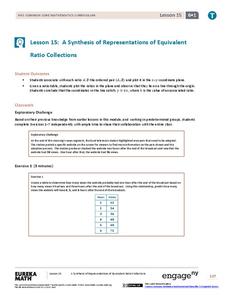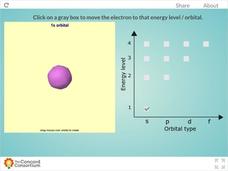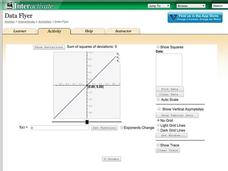Angel Island Immigration Station Foundation
Interview a Family or Community Member: Taking Oral Histories
Young scholars gain insight into how historians record events by engaging in an oral history project. In preparation, class members brainstorm open-ended interview questions and take part in and debrief a mock interview simulation....
Flipped Math
Calculus AB/BC - Reasoning Using Slope Fields
Find a solution in the field. An informative video presentation shows pupils how to use the information from a slope field to sketch the graph of a particular solution to a differential equation. Individuals learn how to determine the...
Overcoming Obstacles
Identifying Your Learning Style
How many different learning styles are there? Four? Five? Seven? Twelve? It depends on who you ask. But the point of this lesson is that people learn differently, and most have a way or ways that work best for them. To help identify...
Curated OER
Identify and Label Different Types of Angles
Students identify and label acute, obtuse, and right angles within a picture. Using Kid Pix software and digital photos, they manipulate, identify, and label the angles and describe the angles to a classmate.
National Wildlife Federation
Call of the Wild: Grades K-4
The sound a frog makes lets people know what it's up to. A two-part lesson begins by discussing the life cycle of a frog and the individual stages with drawings. The second part has learners listen to the frogs' different sounds and what...
National Wildlife Federation
Controversy Over Wild Cats
Everyone should take an interest in the fate of wild cats. A thorough lesson plan explores the habitat changes of native North American wild cats and asks learners to make connections to human development. They consider the implications...
National Wildlife Federation
Night Friends - American Bats
Bats are a misunderstood species. Pupils learn about the characteristics of bats in a three-part lesson. They begin by examining the adaptations of different types of bats, then explore the misconceptions humans have about the species....
National Wildlife Federation
The Wheel of Trouble
What kind of troubles affect turtles? Learners create paper plate wheels to show four different hazards to sea turtles. Pupils color four segments of a picture to represent the overharvesting, changing beaches, pollution, and fishing...
University of Chicago
Exercise in Conflict Resolution
How do major religions, including Judaism, Christianity, and Islam, differ in how they view the role of individual freedoms within society, the definition of morality, and the importance of politically satisfying the greater good? Here...
Super Teacher Worksheets
Ten Frames
Developing a strong number sense in the primary grades is essential to the success of young mathematicians. These simple worksheets present learners with a series of ten-frames, asking them to write the number shown in each model....
Poster-Street
A Smart Reader
Teach your class what it means to be a smart reader with this simple classroom poster. Including short I am statements describing seven different reading strategies, this is a great resource for improving students' reading comprehension...
Curated OER
Pi Notebooking Pages
What is it about pi that is so captivating? Learners can take notes about pi and other mathematical concepts on one or all five of these different pi-themed pages.
Texas Center for Learning Disabilities
Second-Grade Explicit Intervention
Unfortunately, not all students learn to read at the same pace, but with the help of this resource, you can ensure that they all receive the support they need to reach this important goal. Comprised of short literacy activities, these...
NASA
Pop! Rockets
Off they go — launching rockets is fun. The lesson plan contains templates to build paper rockets that can be launched from a PVC pipe launcher. Individuals or groups build the rockets and determine the shapes for their fins. Included...
EngageNY
Deriving the Quadratic Formula
Where did that formula come from? Lead pupils on a journey through completing the square to discover the creation of the quadratic formula. Individuals use the quadratic formula to solve quadratic equations and compare the method to...
Balanced Assessment
Transformation I
Rewriting expressions in different forms is an essential algebra skill. Support the development of this skill by using a task that asks scholars to begin with a linear, quadratic, and rational expression and then manipulate them into a...
Balanced Assessment
Scaling the Stars
Examine ratio and scale through coordinate geometry. Scholars use two diagrams of different scale to calculate perimeter and area. Then, individuals use the perimeters and areas to find ratios.
Mathed Up!
Nets, Plans, and Elevations
A dimensional resource teaches viewers to recognize 2-D views of 3-D objects and how to match nets with their 3-D figures. Individuals draw different views of three-dimensional objects including views from the front, side elevations and...
Noyce Foundation
Digging Dinosaurs
Build a function to solve problems rooted in archeology. A comprehensive set of five lessons presents problems requiring individuals to use functions. The initial lesson asks learners to find the possible number of dinosaurs from a...
PBL Pathways
Medical Insurance 2
Make an informed decision when choosing a medical insurance provider. An engaging lesson asks your classes to write piecewise models to represent the cost of different medical plans. The project-based learning activity is a variation of...
EngageNY
A Synthesis of Representations of Equivalent Ratio Collections
Make all the ratio representations fit together. The 15th segment in a series of 29 presents ratio problems to solve. Scholars use a variety of representations to respond to the questions. The problem set has pupils show how the...
Concord Consortium
Energy Levels of a Hydrogen Atom
Tired of blowing up countless balloons to illustrate orbital shapes around an atom? Give your lungs a break and use an interactive instead! Learners observe s, p, d, and f orbitals through the first four energy levels using hydrogen as a...
Concord Consortium
Direction and Strength of Force in Electric Fields
Finally, a helpful tool for modeling electric fields! Young physicists explore the unseen world of magnetism via a simple interactive. Individuals move a charged object around a stationary object and see the strength and directions of...
Shodor Education Foundation
Data Flyer
Fit functions to data by using an interactive app. Individuals plot a scatter plot and then fit lines of best fit and regression curves to the data. The use of an app gives learners the opportunity to try out different functions to see...







